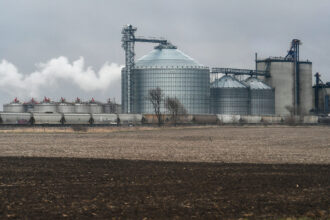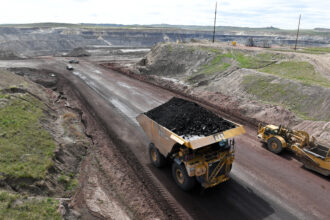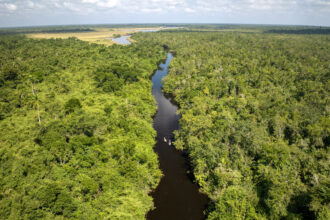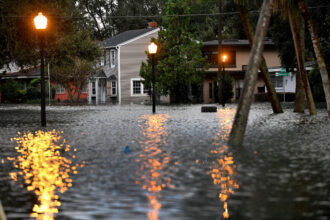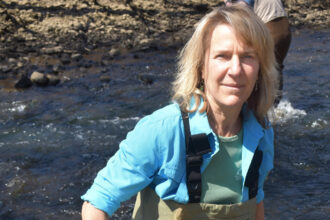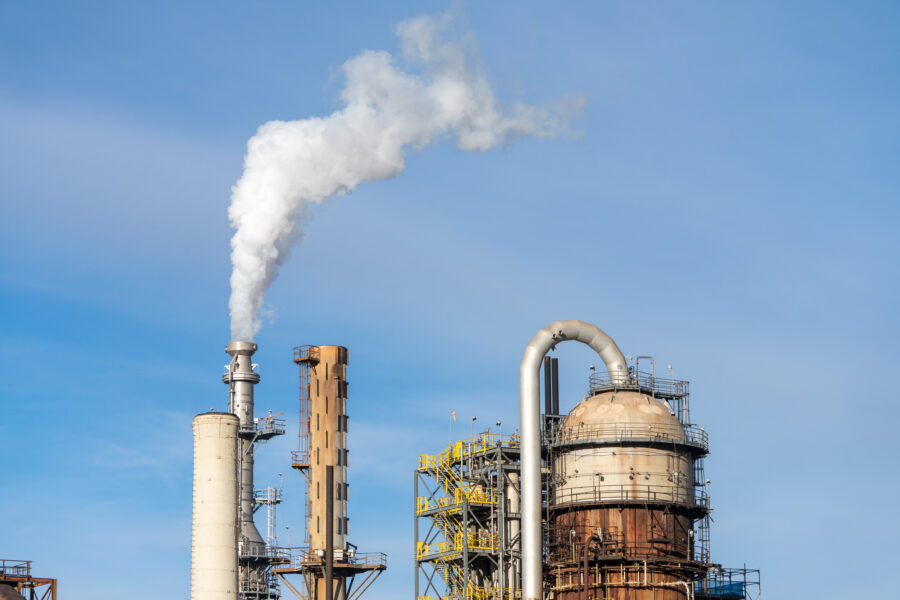As Wyoming nears the end of its 2024 legislative session, clean energy advocates and climate change skeptics find themselves in an uneasy situation: an alliance. Both groups oppose legislation that would weaken and delay the state’s carbon capture requirements, albeit for wildly different reasons.
Wyoming has bet a portion of its future economy on the proliferation of carbon capture, “low-carbon” fossil fuels and hydrogen. As a result, the state has encouraged companies to explore use-cases for coal, oil and fracked natural gas that would keep them viable in a clean-energy power sector. In 2020, Wyoming’s legislature enshrined this goal into law by passing House Bill 200, which requires power plants to generate electricity using carbon capture with fossil fuels by 2030.
But this week, the legislature is considering Senate File 42, which would amend House Bill 200 to decrease the amount of carbon a utility must capture at its power plants in order to be considered “low-carbon,” and postpone the date of compliance to 2033.
The Cowboy State’s push to find a home for fossil fuels in a world powered by wind and sunlight appears to have scrambled its traditional political fault lines when it comes to energy and environmental policy.
Some environmentalists in Wyoming oppose Senate File 42 on the grounds that promoting carbon capture, a nascent technology that is decades from viability, is coming at the expense of investing in renewable energy—already a cheaper source of electricity than almost all U.S. coal plants—in the effort to reduce the concentrations of atmospheric greenhouse gases that are warming the planet. Senate File 42, they say, is merely postponing the objectives of House Bill 200 and letting utilities avoid conceding that carbon capture is too expensive and too undeveloped a technology to save Wyoming’s fossil fuels.
In an dizzying turn of political gymnastics, they find themselves siding with lawmakers skeptical of the very science of climate change, who agree that carbon capture is too costly an experiment for Wyoming ratepayers to bear, and who appear to have voted against Senate File 42, in part, because they do not believe excess carbon dioxide in the earth’s atmosphere poses a threat to humanity and consequently doesn’t need to be captured at all.
Governor Mark Gordon’s administration, oil and gas companies, mining corporations and utilities, have all credited the global shift to renewable energy—and corresponding decrease in demand for coal—as justification for carbon capture, an implicit acknowledgement of the effects of climate change on the global energy economy. To Senate File 42’s supporters, the costs ratepayers would bear for a utility to explore carbon capture are worthwhile if the technology can one day preserve the market for Wyoming coal, which it exports to 26 other states as fuel for power plants. But, in retrospect, they’ve decided, current law has put the cart before the horse, requiring utilities to deploy costly technology before it’s ready.

Environmentalists, on the other hand, are skeptical of carbon capture altogether, and don’t want to make it cheaper or easier for utilities to implement something they fear will displace Wyoming’s investments in renewable energy and could fail regardless of how much time utilities have to meet the goals.
“We’re opposed to the bill,” said Shannon Anderson, an attorney with the Powder River Basin Resource Council, a state-based conservation organization. Anderson and Claire Deuter, an organizer with the council expressed their organization’s concerns before the House and Senate Minerals, Business and Economic Development committees earlier this month, saying the proposed legislation does not align with a cost-effective energy future for Wyoming.
“We are extremely concerned about the impact to ratepayers,” Deuter told the House committee. Utilities may recoup expenses for carbon capture construction, operation, analysis and engineering projects, but the unproven nature of the technology makes it “likely all of this will result in the lack of a viable project, and in the end, Wyomingites will have paid millions into something that is never put into use,” she said.
“We just see this as a lost cause.”
With the 2030 deadline only a handful of years away, Anderson said that utilities have begun balking at their chances of complying with the law. “Utilities have been consistently saying that the technology’s not ready,” she said. Retrofitting a half-century-old coal plant, she continued, is impractical, could require too much water and could lead to rate increases for technology that may never be fully viable.
“There’s a host of issues,” Anderson said. “It’s not technically or economically feasible to retrofit coal carbon capture at any facility out there in the state right now.”
Deuter told the House committee that further entrenching carbon capture into state law would “not encourage renewable energy and the economic development that could bring to Wyoming.”
Instead, the Powder River Basin Resource Council would prefer “House Bill 200 to play out the way it is now,” she said. Once utilities file their carbon capture prospects the legislature could “start fresh” and reconsider whether enshrining the practice into law is the best path forward for the state.
Under Senate File 42, a utility qualifies as producing “low-carbon” electricity as long as it is fitted with a carbon capture unit designed to pull in 75 percent of a plant’s baseline CO2 emissions. But for a utility to be in compliance with the amended law, that unit would need to capture only 18,750 metric tons of a plant’s annual CO2 emissions—about half a percent of the annual emissions from a coal-fired power plant, according to the Environmental Protection Agency’s carbon calculator.
Utilities would also have more time to meet the relaxed carbon capture thresholds, and would be allowed to recover the costs of securing funding, researching and implementing pilot projects and conducting various other carbon-capture studies by increasing ratepayers’ bills by as much as two percent.
Anderson, Deuter and The Powder River Basin Resource Council have ended up on the same side of the proposed amendments as “climate denialists believing that we shouldn’t pay for carbon capture,” she said. But the two sides are “coming at it from a very different perspective.”
Among the 10 state Senators who voted against Senate File 42 in its final Senate floor vote were Tim French, Bob Ide, Dan Laursen and Cheri Steinmetz, representing Park, Natrona, Big Horn and Goshen counties, respectively. Two weeks earlier, the four had hosted a presentation given by the CO2 Coalition, an organization that peddles “facts, resources and information about the vital role carbon dioxide plays in our environment.”
Steinmetz, chairman of the Senate Agriculture, State and Public Lands & Water Resources Committee, welcomed the CO2 Coalition by foregrounding her “definite difference of opinion” from Gordon, who has pledged to reduce Wyoming’s emissions, “on policy issues regarding CO2.”
Gregory Wrightstone, the coalition’s executive director and a former head of a regional branch of the American Association of Petroleum Geologists, kicked off the group’s presentation by saying “carbon dioxide should be celebrated, not captured,” and proceeded to give a presentation rife with misinformation about climate change that contradicts both the global and regional consensus regarding greenhouse gases influence on global warming. At one point, Wrightstone said that, in Wyoming, “maximum average daily temperature has been declining for 90 years,” a claim he purported was backed up by National Oceanic and Atmospheric Administration (NOAA) data.
Howard Diamond, climate science program manager at NOAA’s Air Resources Laboratory, called Wrightstone’s findings “simply not in keeping with the science.” After looking at Wrightstone’s chart, Diamond said he did not know where Wrightstone got his data, and said his claims were “pretty misleading.”

“I could go over reams and reams of data and science dating back nearly 200 years, but frankly, the relationship between increasing CO2 and increasing temperatures could not be clearer,” he said.
NOAA’s temperature data from the last 90 years—the time period Wrightstone referenced in his presentation— shows the average maximum temperature in Wyoming has increased 0.2 degrees Fahrenheit per decade.
Wrightstone was joined that day by Byron Soepyan, a “research and science” associate—he has a Ph.D. in chemical engineering from the University of Tulsa—with the CO2 Coalition, who presented about carbon capture’s cost and “the dangers of CO2 capture.” Retrofitting Wyoming’s fossil fuel power plants with carbon capture would cost billions of dollars, he said, and the practice could create and release volatile organic compounds into the atmosphere, contaminate nearby sources of groundwater if CO2 were stored underground or used to revive oil and natural gas fields and rupture pipelines—resulting in hospitalizations from exposure to high concentrations of CO2.
Soepyan wrapped up by asserting that carbon capture is “not worth pursuing for the state of Wyoming.”
“Unnecessary, costly and dangerous,” Ide said. “That’s a good finish on that presentation right there.”
Laursen proved receptive to the CO2 Coalition’s presentation, too, at one point asking Wrightstone for an explanation regarding the “false narrative” that increasing earth’s temperature by 1.5 degree Celsius would negatively impact life on earth.
Scientists have known for decades that excess amounts of CO2 and other greenhouse gases in the earth’s atmosphere—driven largely by the burning of fossil fuels—are the primary drivers of climate change. They have warned for years that warming the earth’s average temperature by more than 1.5 degrees Celsius above pre industrial levels, or 2.7 degrees Fahrenheit, would trigger drastic and irreparable changes in land and ocean ecosystems.
At a press conference held a day after the CO2 Coalition’s presentation, French, a farmer, spoke glowingly about the gas and argued it should be left alone in the atmosphere, according to WyoFile’s coverage of the event. “I need a lot of CO2 to grow my crops,” he said. “In my world, my business, I really need it.”
But the Intergovernmental Panel on Climate Change, which produces climate change reports driven by researchers and data from across the globe, found last year that climate change has already stressed “agriculture, forestry, fisheries and aquaculture, increasingly hindering efforts to meet human needs,” and will “increase the number of people at risk of hunger” by 2050.
Senators French, Ide and Laursen did not return requests for comment.
In a statement to Inside Climate News, Steinmetz said “I do not support using taxpayer funds in this manner.” Unless the carbon capture legislation is repealed, “Wyoming rate payers will pay for these policies,” she said.
“Wyoming coal is the cleanest coal in the world,” she continued, and the state should “proudly declare that and protect the industry that provides dispatchable, affordable energy for our schools, hospitals and industry. Wind, solar and other intermittent sources cannot power the nation.”
When asked whether the CO2 Coalition’s presentation influenced her vote on Senate File 42, Steinmetz declined to comment, and she would not say whether she accepts that excess CO2 in the earth’s atmosphere, driven largely by human activity, is causing climate change.
Senators French, Ide, Laursen and Steinmetz appear to be out of step with the prevailing conservative approach to climate change in Wyoming. Tyler Lindholm, director of the Koch-backed political organization Americans For Prosperity-Wyoming and a former member of Wyoming’s House who voted against House Bill 200 in 2020, supports Senate File 42 and believes that CO2 should be captured if it will help preserve the state’s coal industry.
“We’ve got to find ways to check the box on affordability and reliability and drop the semantics otherwise,” he said.
Lindholm said that Wyoming is surrounded by other Western states with commitments to reduce greenhouse gas emissions from their power sectors. Regardless of Wyoming’s stance on carbon dioxide, those other states’ “transmission lines do not recognize state lines,” he said. If the state can figure out how to deploy carbon capture then it will continue to “have a viable product that is sold in other states.”
Many of Senate File 42’s supporters view carbon capture as a lifeline to the state’s coal industry, testifying as much while the bill was under consideration in the Senate.
This story is funded by readers like you.
Our nonprofit newsroom provides award-winning climate coverage free of charge and advertising. We rely on donations from readers like you to keep going. Please donate now to support our work.
Donate Now“The Wyoming Mining Association fully supports the deployment, research, and development of carbon capture technology. We believe this is necessary to keep our coal resource viable,” said Travis Deti, executive director of the Wyoming Mining Association, in remarks to the Senate Minerals, Business and Economic Development committee considering Senate File 42. “It does cost a little bit, this whole exercise of carbon capture, but we believe it’s necessary.”
Should it pass Wyoming’s House, Senate File 42 would then head to Gordon’s desk, where it is likely to receive his signature.
Randall Luthi, Gordon’s energy advisor, expressed his support for Senate File 42 before both the House and Senate Minerals, Business and Economic Development committee earlier this month.
“Regardless of your views on what carbon dioxide does or does not do to the atmosphere, the truth is, consumers [and federal and state regulators] are all looking for a way to reduce CO2,” he said. Senate File 42’s amendments to House Bill 200 would allow Wyoming to “keep the coal-fired power plants burning.”








